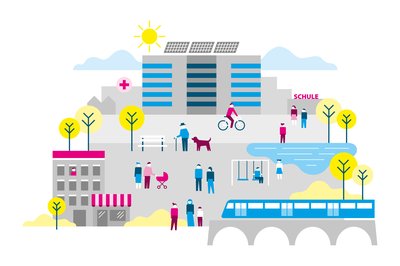Guiding Themes
The guiding themes for the IBA_Vienna 2022 form the framework for the activities of the next few years and are intended to be effective beyond that. The projects of the IBA_Vienna are to focus primarily on the following topics:

New Social Neighbourhoods
The creation of new social neighborhoods, the urban development process and the functionality and multifaceted usability of new urban neighborhoods form the framework for dealing with new forms of living and living together, optimized construction methods, new financing and land models, the search for (suitable) developers and urban user groups etc..
Urban succession processes, mixed use, the redevelopment of existing buildings in post-war neighborhoods, but also learning from successes and failures form a breeding ground for the experimental field and the laboratory situation, which are needed for creative approaches and the implementation of new solutions.

New Social Qualities
History shows how much the demands on housing construction have changed over the past decades. The development of tools for quality assurance in housing has undoubtedly had great merit in ensuring (minimum) standards for housing, but at the same time exogenous factors (e.g. location, stage of life, milieu ...) have a decisive influence on the suitability or appropriateness of the housing situation. In the ongoing development of quality standards—in the context of climate change, changing lifestyles and socio-cultural models of life—there must therefore always be feedback on questions of adequacy of and access to subsidized housing.
Dealing with societal changes, social sustainability in neighborhoods, the development of the cost of living and the resulting expenditure on housing, the reduction of cost pressure in housing construction as well as new organizational, process and financing structures are the focus of this central theme.

New Social Responsibility
What is specific to the IBA in Vienna is the high value placed on state and municipal responsibility and active housing subsidies for social housing construction. In view of the increasingly tense situation of the municipal financial budget and the simultaneous increase in the number of people in precarious circumstances, questions arise as to the further development of the existing range of tools available in subsidized housing.
Key topics will be the promotion of individual initiative, the involvement of new stakeholders, new support models and forms of cooperation and participation, as well as awareness raising and the internationalization of social housing at a general level.